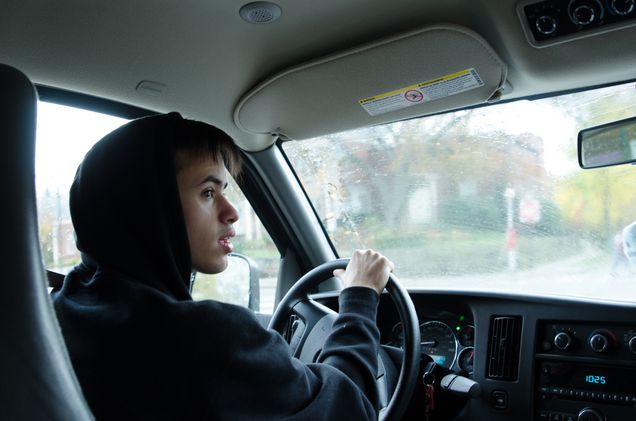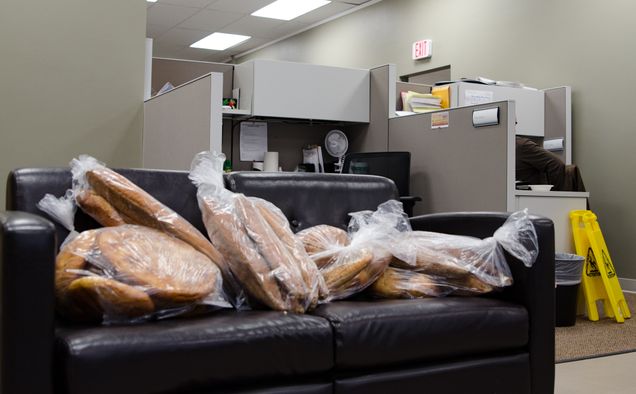#BUandBoston: Student Food Rescue Fights Waste One Loaf at a Time
By: Douglas Darrah
Americans waste 133 billion pounds of food every year and BU students are doing something about it. Ever since 1988, the Student Food Rescue program (SFR) has been saving day old bread, deformed-yet-edible fruit, and unwanted potatoes from the dumpster. They organize “food runs” where two or more volunteer students will take one of their two temperamental vans, pick up food from a donor site, and then drop it off at a recipient site. Thanks to these runs, thousands of people who would otherwise go hungry are fed.
Brett Rado (QST ‘23) and Tyler Lee (CGS ‘21) are both relatively new to the program, but they learned the ropes quickly. Brett’s friends in BU’s Community Service Center introduced him to it and he realized that it would be a great way to get out into the community and make a difference. “I didn’t have class on Tuesdays, so I figured I might as well do something useful,” he says. “I like having the opportunity to go out and do something productive.”
Their route begins at 9 am and is supposed to end at 11, though it rarely takes them that long. They meet at the van a little after 9, go over their safety procedures, and start driving towards Clear Flour Bakery. Getting there is not easy, but then again, it is hard to drive anywhere in Boston. Navigating the labyrinth-like roads is like playing fantasy football; not even computers can do it well.
“That was the turn, back there!” Tyler cried as Brett drove past the round-about exit.
“That’s what I get for not following Waze,” Brett replied under his breath.
“You made the same mistake last time and that time you were following Waze,” Tyler notes. “It’s okay, it didn’t change our ETA.”

Their donor site, Clear Flour Bakery, is a quaint French-Italian bakery whose plate-glass front windows feature a pride flag and numerous awards for outstanding baking. The first thing that you notice is the incredible smell that permeates the shop. Student Food Rescue regulations strictly forbid the volunteers from taking any of the donated food (it is both unsanitary and incredibly disrespectful), but the aroma of their fresh baked bread could tempt anyone. Fortunately, Tyler and Brett are professionals; they pick up the bread and hurry back to the waiting van.
Donor sites range from large grocery stores like Whole Foods to small, mom and pop outfits like Clear Flour Bakery. If any of their food items have a slight aesthetic blemish, or if they are three to four days from expiration, then they cannot be sold. They can, however, be donated to someone who needs them.
Student Food Rescue has been arranging for that to happen for 31 years now. This student-led and student-operated program runs 17 routes a week during the school year and 13 routes a week during the summer. They coordinate with dozens of volunteers, rescue over 100,000 pounds of food every year, and feed about a thousand people each week. In addition to their bread and butter functions, they also organize one-time events such as the Fall Days of Service, Global Days of Service, and Journey for Food Justice. Thanks to their consistent success, they were recognized by the National Student Campaign Against Hunger and Homelessness in 2005.
The recipient site is the HIV/AIDS Action Committee of Massachusetts. Founded two years after the discovery of AIDS, the Committee provides contraception, HIV medication, needle exchanges, therapy, legal assistance, food, shelter, and other services meant to holistically address the needs of their patients. Like other recipient sites, they serve people who do not have easy access to safe, nutritious food.
The Committee’s parking lot consists of a dozen spaces meant for compact cars. Brett deftly maneuvers the 12-seater van, which is anything but compact, into one of them. Once he finishes parking, the two of them gather the bread into their arms and head inside. They exchange pleasantries with the receptionist and deposit the donation on the couch. It is claimed before they have even left the building.

This post is part of our #BUandBoston series, highlighting the work and research of BU students, faculty, and staff throughout the City of Boston. Interested in having your Boston-related work featured? Tag us on Instagram or Twitter @BUonCities using the #BUandBoston or send us an email at ioc@bu.edu.
